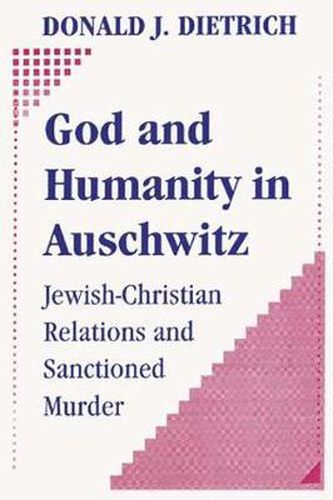Readings Newsletter
Become a Readings Member to make your shopping experience even easier.
Sign in or sign up for free!
You’re not far away from qualifying for FREE standard shipping within Australia
You’ve qualified for FREE standard shipping within Australia
The cart is loading…






God and Humanity in Auschwitz synthesizes the findings of research developed over the last thirty years on the rise of anti-Semitism in our civilization. Donald J. Dietrich sees the Holocaust as a case study of how prejudice has been theologically enculturated. He suggests how it may be controlled by reducing aggressive energy before it becomes overwhelming. Dietrich studies the recent responses of Christian theologians to the Holocaust and the Jewish theological response to questions concerning God’s covenant with Israel, which were provoked by Auschwitz.
Social science has dealt with the psychosocial dynamics that have supported genocide and helps explain how ordinary persons can produce extraordinary evil. Dietrich shows how this research, combined with theological analyses, can help reconfigure theology itself. Such an approach may serve to help dissolve anti-Semitism, to aid in constructing such positive values as respect for human dignity, and to point the way to restricting future outbreaks of genocide.
God and Humanity in Auschwitz surveys which religious factors created a climate that permitted the Holocaust. It also illuminates what social science has to tell us about developing a strategy that, when institutionally implemented, can channel our energies away from sanctioned murder toward a more compassionate society. The book has proven to be an essential resource for theologians, sociologists, historians, and political theorists.
$9.00 standard shipping within Australia
FREE standard shipping within Australia for orders over $100.00
Express & International shipping calculated at checkout
God and Humanity in Auschwitz synthesizes the findings of research developed over the last thirty years on the rise of anti-Semitism in our civilization. Donald J. Dietrich sees the Holocaust as a case study of how prejudice has been theologically enculturated. He suggests how it may be controlled by reducing aggressive energy before it becomes overwhelming. Dietrich studies the recent responses of Christian theologians to the Holocaust and the Jewish theological response to questions concerning God’s covenant with Israel, which were provoked by Auschwitz.
Social science has dealt with the psychosocial dynamics that have supported genocide and helps explain how ordinary persons can produce extraordinary evil. Dietrich shows how this research, combined with theological analyses, can help reconfigure theology itself. Such an approach may serve to help dissolve anti-Semitism, to aid in constructing such positive values as respect for human dignity, and to point the way to restricting future outbreaks of genocide.
God and Humanity in Auschwitz surveys which religious factors created a climate that permitted the Holocaust. It also illuminates what social science has to tell us about developing a strategy that, when institutionally implemented, can channel our energies away from sanctioned murder toward a more compassionate society. The book has proven to be an essential resource for theologians, sociologists, historians, and political theorists.